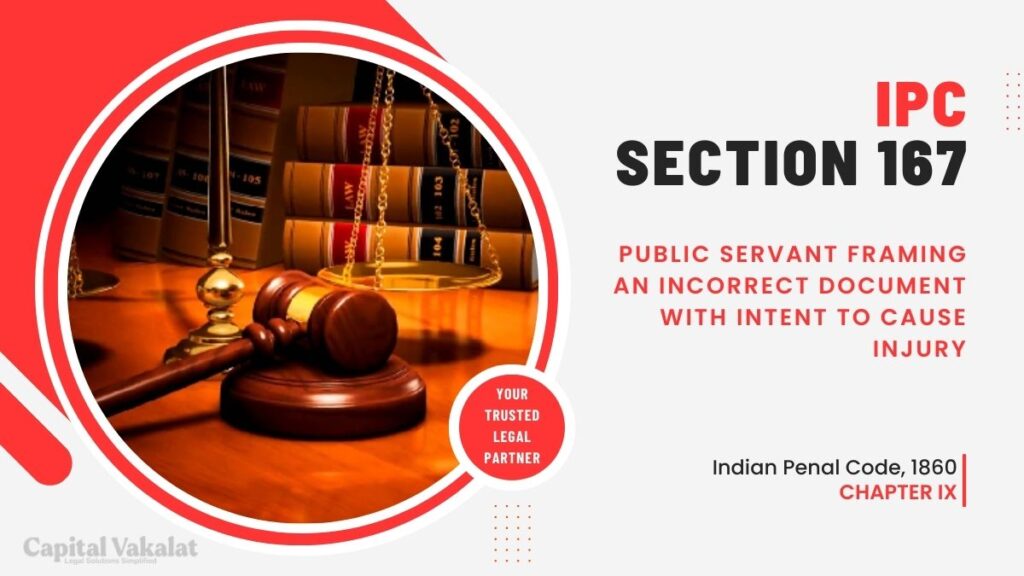In the vast realm of legalities, Section 167 of the Indian Penal Code (IPC) stands as a significant provision, aiming to maintain transparency and accountability in public administration.

This article delves into the intricacies of this law, focusing on the grave offense of a public servant framing an incorrect document with the intent to cause injury. We will explore the legal aspects, ramifications, and its impact on society.
Understanding Section 167 of the Indian Penal Code
Section 167 of the IPC primarily deals with the misconduct of public servants. It is a crucial provision that holds those in positions of power accountable for their actions. This section aims to prevent any malicious intent by public servants, ensuring the public’s trust in government officials.
The Role of a Public Servant
Public servants are individuals entrusted with significant responsibilities. They hold positions that require them to act in the public’s best interest, making decisions and documenting matters with utmost integrity. Section 167 emphasizes the importance of these roles and the duty that comes with them.
Elements of the Offense
To understand this offense, it is essential to break it down into its key elements. The offense involves two crucial components: intent to cause injury and framing incorrect documents.
Intent to Cause Injury
One of the primary aspects of this offense is the intent to cause harm. Public servants must not misuse their powers to harm individuals or entities intentionally. This intent must be proven in court to establish guilt.
Framing Incorrect Documents
Framing incorrect documents refers to the deliberate act of creating or altering records, reports, or documents with false or misleading information. This can lead to grave consequences, especially when these documents are used as evidence in legal matters.
Legal Consequences
Public servants found guilty under Section 167 can face severe legal consequences, including imprisonment and fines. The gravity of the offense is reflected in the punishment prescribed by the law, aiming to deter any misconduct.
Precedents and Case Studies
To gain a better understanding of the real-world implications of Section 167, let’s explore some notable case studies and precedents where public servants were charged under this section. These cases serve as a stark reminder of the importance of upholding integrity in public service.
The Importance of Accountability
Accountability in public service is vital for maintaining the public’s trust in government institutions. Section 167 acts as a deterrent, ensuring that those in power act responsibly and honestly.
Legal Defenses
While the law is stringent, public servants also have legal defenses available to them. They can challenge the allegations, providing evidence to prove their innocence. This highlights the balance between holding individuals accountable and ensuring justice is served.
Challenges in Prosecution
Prosecuting public servants under Section 167 can be a challenging endeavor. The burden of proof lies with the prosecution, and ensuring that intent and the framing of incorrect documents are established can be complex.
Public Perception
The perception of public servants and government institutions significantly influences the public’s trust in the system. Cases of misconduct can erode this trust, emphasizing the need for strict enforcement of Section 167.
Impact on Society
The impact of public servants framing incorrect documents with the intent to cause injury goes beyond the legal realm. It affects individuals, organizations, and the broader society. This offense can have far-reaching consequences, both direct and indirect.
Conclusion
Section 167 of the IPC is a crucial provision that underscores the need for public servants to act with integrity and responsibility. It serves as a shield against any malicious intent and emphasizes the significance of public trust in government institutions.
In this complex legal landscape, Section 167 IPC serves as a crucial provision, upholding the values of integrity, accountability, and transparency in public service. It stands as a testament to the importance of maintaining public trust in government institutions and the commitment to holding those in power accountable for their actions.
Frequently Asked Questions
How can a public servant defend themselves against allegations under Section 167?
Public servants have legal defenses available, including providing evidence to prove their innocence.
Why is public perception crucial in cases involving public servants under Section 167?
Public perception impacts the trust in government institutions, making it vital to address cases of misconduct promptly.
What is the intent to cause injury in the context of Section 167?
Intent to cause injury refers to a deliberate and malicious motive to harm individuals or entities.
How does Section 167 contribute to transparency in public administration?
Section 167 ensures public servants act with integrity, promoting transparency and accountability in government.